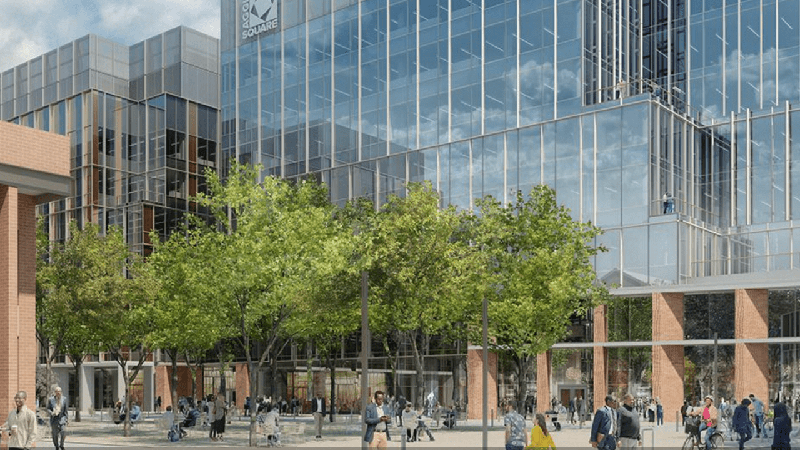Nearly five years after announcement of $1.1 billion life-sciences center, construction is finally underway.

An artists rendering of the Life Long Learning Building now under construction at Aggie Square, as seen from from Stockton Boulevard.
Just south of UC Davis Medical Center in Sacramento, the structures for two buildings have unmistakably begun to take shape.
Known as the Life Long Learning Building and the Science & Technology Building East, they are part of Aggie Square, a $1.1 billion center that could teach and employ thousands of people. These buildings could open in late 2024 or early 2025, representing the first phase of the long-promised and long-touted center.
“If you go by Stockton Boulevard, you can really start to visualize that part of the project,” said Robert Segar, planning director for Aggie Square and associate vice chancellor for UC Davis.
First announced in April 2018, Aggie Square has gotten consistent buzz from local officials and other regional leaders. In addition to the expanded UC Davis science and technology campus, future tenants will include the Alice Waters Institute for Edible Education as well as tech and life-science companies.
“I think people are gonna walk through it and … you’re gonna get a NASA-like feeling,” said Barry Broome, president and CEO of the Greater Sacramento Economic Council. “I think it’s going to be so impressive.”
The City of Sacramento, which is partnering with UC Davis and others on the project, describes the project on its website as a “state-of-the-art hub for research, innovation and education.” UC Davis Chancellor Gary May brought the idea to Sacramento after working at the Georgia Institute of Technology, which built a similar project in Atlanta.
In addition to the two buildings currently under construction, Aggie Square is also slated to include the Science & Technology Building West, a mixed-use housing building, and a parking garage. The project hasn’t been without controversy. The Aggie Square Development organization faced a lawsuit from a local union, AFSCME 3299, under the California Environmental Quality Act, which resulted in a settlement in late 2021.
There have also been concerns that the project could lead to gentrification and displacement of residents from nearby communities, which include Oak Park and Tahoe Park. Dozens of vacant or blighted parcels can be found along Stockton Boulevard not far from the project site, which is directly to the east of the boulevard between 2nd and 3rd avenues.
“The reality is Aggie Square could be the best thing for the neighborhood, and it could be the worst thing for the neighborhood,” Sacramento City Councilmember Eric Guerra told me in 2020. “But for us to do nothing doesn’t improve our situation in the commercial corridor.”
'It’s exciting to drive down Stockton Boulevard and see the new energy, the new development, and the new opportunity.'
The group Sacramento Investment Without Displacement pushed for a community benefits agreement, with people connected to the project initially resisting the idea and suggesting a letter of intent instead. But in 2021, the city, UC Davis, and Wexford Science & Technology, LLC, which is building Aggie Square, agreed to a community benefits partnership agreement, which included a promise of $50 million for affordable housing development and a commitment to local hiring.
“This is what inclusive economic development really means,” Sacramento Mayor Darrell Steinberg said in a statement at the time. “Aggie Square is the single biggest high-wage jobs and housing opportunity we have had in this city in decades. The Community Benefits Partnership Agreement is a promise to all of Sacramento that this transformational project will be for all, not just for some.”
Since reaching the agreement, the first of its kind in Sacramento history, city leaders including Guerra, who is now vice mayor, have been continuing to meet with residents and others interested in Aggie Square.
“It’s exciting to drive down Stockton Boulevard and see the new energy, the new development, and the new opportunity,” Guerra said in an interview last week. “And that’s down Broadway, all the way down past Fruitridge. And we’re gonna keep pushing more support for an area that has been forgotten.”